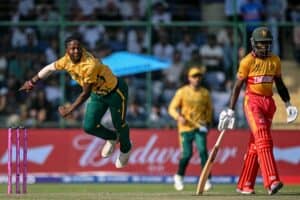Safa president Danny Jordaan has asked local members to debate the issue. One of them, Safca, has very strong views on the matter.

Keagan Dolly’s move from Mamelodi Sundowns to French outfit Montpellier is notable for far more than just the R25 million transfer fee.
In fact, the 24-year-old winger has South African soccer scratching its head again over an old debate: is local development better than sending a player to Europe?
Safa president Danny Jordaan considers the issue serious enough that he sent out a memo last month to local members encouraging discussion.
One stakeholder totally opposed to exporting promising local players to Europe is the South African Football Coaches Association (Safca).
Replying to Jordaan’s correspondence dated 26 January, Safca state” having more and more players from developing countries playing at European clubs does not guarantee success”.
Instead, the association argues farming players out overseas makes local soccer teams copy foreign coaching philosophies that don’t complement local players’ strengths.
“Asia and Africa need to first and foremost establish distinct, national football cultures before they can consistently win on the international stage,” Safca writes.
They cite the examples of the three previous World Cup winners – Italy (2006), Spain (2010) and Germany (2014).
When the Italians triumphed more than a decade ago, all 20 Serie A sides had local coaches.
Spain boasted 17 local coaches out of 20 La Liga teams when they won in South Africa, while Germany had 13 out of 18 in the 2013/14 season.
“Coaches from Africa must be developed and empowered with knowledge that considers the African way of playing,” says Safca.
“South Africa won the 1996 Afcon title and were runners-up in 1998 with Clive Barker and Jomo Sono as head coaches respectively. About 90% of the 1996 team where playing locally.”
Local structures remain a headache as well as faulty coaching material.
“Safa have adopted the YDF manual (German version of social youth football) as a curriculum for the SAFA D license despite the fact that its content is not recognised by the German Football Federation,” says Safca.
“The content is erroneous and irrelevant. SAFCA remains firmly committed to the implementation of the South African Football Philosophy.”
The association also expressed its concern over the recent spate of local coaches being fired or sidelined.
“Safca is extremely worried about a lack of national discourse on technical matters and a clampdown on coaches expressing their views.
The banning of Simon Ngomane, Greg Mashilo and the dismissal of Bafana Bafana coach Shakes Mashaba creates a very toxic environment. Coaches are unable to engage in brutally honest discussions about the state of the game.”
For more sport your way, follow The Citizen on Facebook and Twitter.
Support Local Journalism
Add The Citizen as a Preferred Source on Google and follow us on Google News to see more of our trusted reporting in Google News and Top Stories.






